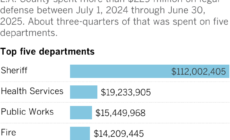-
In Counting the Dead in Iran, a Picture of Ferocity - 37 mins ago
-
James Harden Breaks Silence on Clippers-Cavaliers Trade - about 1 hour ago
-
How 2026 Winter Olympics Security Is Preparing For The Opening Ceremony - about 1 hour ago
-
William Stevenson, Jill Biden’s Ex-Husband, Is Accused of Killing His Current Wife - 2 hours ago
-
Will Newsom Be the Democrats’ Next Mistake? - 3 hours ago
-
More Americans Say Immigration Makes US ‘Better Off’ in 15% Swing: Poll - 3 hours ago
-
Catherine O’Hara, Star of ‘Best in Show,’ Honored in Westminster Dog Show Tribute - 4 hours ago
-
Inside the LAPD’s most notorious shadow unit - 4 hours ago
-
Don Lemon Takes Stage at NYC Event After Arrest Over Minnesota Protest - 4 hours ago
-
L.A. stopped a couple from demolishing Marilyn Monroe’s home. Now, they’re suing - 5 hours ago
Higher Risk of Miscarriage in IVF When Father Is Elder Millennial
Paternal age plays a critical role in IVF success—even when using eggs from young, healthy donors—a study has found.
At the 41st ESHRE Annual Meeting, researchers reported that male partners over 45 have higher miscarriage risks and lower live birth chances during IVF with donor eggs.
The research, spanning 1,712 donor egg IVF cycles conducted between 2019–2023 in Italy and Spain, aimed to isolate the impact of paternal age by controlling for maternal variables.

Moment Makers Group
All cycles involved fresh oocytes (immature eggs found in the ovaries) from young donors (average age 26.1), frozen sperm from male partners and a single blastocyst embryo transfer. The average age of female recipients was 43.3.
When results were analyzed, stark differences emerged between the two paternal age groups: Miscarriage rates were 23.8 percent among couples with male partners over 45, compared to 16.3 percent in those with younger male partners.
“It was genuinely surprising to see how strongly paternal age affects miscarriage and live birth rates, even in oocyte donation programs,” lead author and embryologist Maria Cristina Guglielmo of Eugin Italy told Newsweek.
Live birth rates dropped to 35.1 percent in the older paternal group, versus 41 percent for those aged 45 or younger.
“This challenges the common perception that maternal factors are the primary drivers of reproductive success and highlights the need to pay more attention to paternal factors in fertility,” said Guglielmo.
She explained that biological changes in sperm linked to aging—such as increased DNA mutations, abnormal chromosome counts, DNA fragmentation and altered epigenetics—can compromise embryo development and raise miscarriage risk.
“Together, these factors affect both the genetic integrity and the functional quality of sperm, which can impair embryo development and contribute to a higher risk of miscarriage,” she added.
Importantly, the study only included first embryo transfers and excluded repeat cycles, allowing for a clearer comparison.
According to Guglielmo, this strengthens the evidence that paternal age is not just a minor variable, but a significant factor in reproductive outcomes.
“Our hypothesis is that time does not change the ability of sperm to produce embryos however, some genetic defects in sperm only become apparent later in the process, potentially leading to adverse effects on embryo development and contributing to negative selection outcomes in the fetus,” she said.
For couples who are considering starting a family later on in life via IVF, Guglielmo advises to consult with a fertility specialist early to understand how paternal age might affect chances and explore all the available options.
“All women know how the miscarriage is associated to mother age; however, it’s time to inform the couple about how the father age is also important, especially during the pregnancy, in order to evaluate a prenatal screening,” she said.
“Being well-informed and proactive can help couples make the best decisions for their family-building journey and improve their chances of achieving a successful and healthy live birth.”
Do you have a tip on a health story that Newsweek should be covering? Do you have a question about IVF? Let us know via health@newsweek.com.
Reference
Guglielmo, M.C., et al. (2025). Advanced paternal age affects miscarriage and live birth outcomes following the first transfer in oocyte donation cycles. Human Reproduction.
Source link













